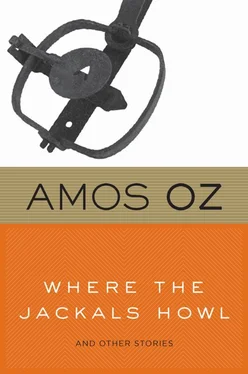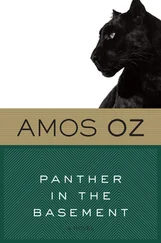Amos Oz - Where the Jackals Howl
Здесь есть возможность читать онлайн «Amos Oz - Where the Jackals Howl» весь текст электронной книги совершенно бесплатно (целиком полную версию без сокращений). В некоторых случаях можно слушать аудио, скачать через торрент в формате fb2 и присутствует краткое содержание. Год выпуска: 2012, Издательство: Houghton Mifflin Harcourt, Жанр: Современная проза, на английском языке. Описание произведения, (предисловие) а так же отзывы посетителей доступны на портале библиотеки ЛибКат.
- Название:Where the Jackals Howl
- Автор:
- Издательство:Houghton Mifflin Harcourt
- Жанр:
- Год:2012
- ISBN:нет данных
- Рейтинг книги:4 / 5. Голосов: 1
-
Избранное:Добавить в избранное
- Отзывы:
-
Ваша оценка:
- 80
- 1
- 2
- 3
- 4
- 5
Where the Jackals Howl: краткое содержание, описание и аннотация
Предлагаем к чтению аннотацию, описание, краткое содержание или предисловие (зависит от того, что написал сам автор книги «Where the Jackals Howl»). Если вы не нашли необходимую информацию о книге — напишите в комментариях, мы постараемся отыскать её.
Where the Jackals Howl — читать онлайн бесплатно полную книгу (весь текст) целиком
Ниже представлен текст книги, разбитый по страницам. Система сохранения места последней прочитанной страницы, позволяет с удобством читать онлайн бесплатно книгу «Where the Jackals Howl», без необходимости каждый раз заново искать на чём Вы остановились. Поставьте закладку, и сможете в любой момент перейти на страницу, на которой закончили чтение.
Интервал:
Закладка:
She’s afraid of me. She’s as wary as her father and as clever as her mother. She won’t come. And if she does come, I won’t tell her. If I tell her, she won’t believe me. She’ll go and tell Sashka everything. Words achieve nothing. But here there are people and light: supper time.
On every table gleamed cutlery, steel jugs and trays of bread.
“This knife needs sharpening,” Matityahu Damkov said to his neighbors at the table. He cut his onions and tomatoes into thin slices and sprinkled them with salt, vinegar and olive oil. “In the winter, when there’s not so much work to be done, I shall sharpen all the dining-room knives and repair the gutter as well. In fact, the winter isn’t so far away. This khamsin was the last, I think. So there it is. The winter will catch us this year before we’re ready for it.”
At the end of the dining room, next to the boiler room and the kitchen, a group of bony veterans, some bald, some white-haired, are gathered around an evening paper. The paper is taken apart and the sections passed around in turn to the readers who have “reserved” them. Meanwhile there are some who offer interpretations of their own and there are others who stare at the pundits with the eyes of weary, good-humored old age. And there are those who listen in silence, with quiet sadness on their faces. These, according to Sashka, are the truest of the true. It is they who have endured the true suffering of the labor movement.
While the men are gathered around the paper discussing politics, the women are besieging the work organizer’s table. Tanya is raising her voice in protest. Her face is wrinkled, her eyes harassed and weary. She is clutching a tin ashtray, beating it against the table to the rhythm of her complaints. She leans over the work sheets as if bending beneath the burden of injustice that has been laid or is about to be laid on her. Her hair is gray. Matityahu Damkov hears her voice but misses her words. Apparently the work organizer is trying to retreat with dignity in the face of Tanya’s anger. And now she casually picks up the fruits of victory, straightens up and makes her way to Matityahu Damkov’s table.
“Now it’s your turn. You know I’ve got a lot of patience, but there are limits to everything. And if that lock isn’t welded by ten o’clock tomorrow morning, I shall raise the roof. There is a limit, Matityahu Damkov. Well?”
The man contorted the muscles of his face so that his ugliness intensified and became repulsive beyond bearing, like a clown’s mask, a nightmare figure.
“Really,” he said mildly, “there’s no need to get so excited. Your lock has been welded for days now, and you haven’t come to collect it. Come tomorrow. Come whenever you like. There’s no need to hurry me along.”
“Hurry you? Me? Never in my life have I dared harass a working man. Forgive me. I’m sure you’re not offended.”
“I’m not offended,” said Matityahu. “On the contrary. I’m an easygoing type. Good night to you.”
With these words the business of the dining room is concluded. Time to go back to the room, to put on the light, to sit on the bed and wait quietly. And what else do I need? Yes. Cigarettes. Matches. Ashtray.
4
THE ELE CTRIC current pulses in twining veins and sheds a weary light upon everything: our little red-roofed houses, our gardens, the pitted concrete paths, the fences and the scrap iron, the silence. Dim, weak puddles of light. An elderly light.
Searchlights are mounted on wooden posts set out at regular intervals along the perimeter fence. These beacons strive to light up the fields and the valleys that stretch away to the foothills of the mountains. A small circle of plowed land is swamped by the lights on the fence. Beyond this circle lies the night and the silence. Autumn nights are not black. Not here. Our nights are gray. A gray radiance rising over the fields, the plantations, and the orchards. The orchards have already begun to turn yellow. The soft gray light embraces the treetops with great tenderness, blurring their sharp edges, bridging the gap between lifeless and living. It is the way of the night light to distort the appearance of inanimate things and to infuse them with life, cold and sinister, vibrant with venom. At the same time it slows down the living things of the night, softening their movements, disguising their elusive presence. Thus it is that we cannot see the jackals as they spring out from their hiding places. Inevitably we miss the sight of their soft noses sniffing the air, their paws gliding over the turf, scarcely touching the ground.
The dogs of the kibbutz, they alone understand this enchanted motion. That is why they howl at night in jealousy, menace, and rage. That is why they paw at the ground, straining at their chains till their necks are on the point of breaking.
An adult jackal would have kept clear of the trap. This one was a cub, sleek, soft, and bristling, and he was drawn to the smell of blood and flesh. True, it was not outright folly that led him into the trap. He simply followed the scent and glided to his destruction with careful, mincing steps. At times he stopped, feeling some obscure warning signal in his veins. Beside the snare he paused, froze where he stood, silent, as gray as the earth and as patient. He pricked up his ears in vague apprehension and heard not a sound. The smells got the better of him.
Was it really a matter of chance? It is commonly said that chance is blind; we say that chance peers out at us with a thousand eyes. The jackal was young, and if he felt the thousand eyes fixed upon him, he could not understand their meaning.
A wall of old, dusty cypresses surrounds the plantation. What is it, the hidden thread that joins the lifeless to the living? In despair, rage, and contortion we search for the end of this thread, biting lips till we draw blood, eyes contorted in frenzy. The jackals know this thread. Sensuous, pulsating currents are alive in it, flowing from body to body, being to being, vibration to vibration. And rest and peace are there.
At last the creature bowed his head and brought his nose close to the flesh of the bait. There was the smell of blood and the smell of sap. The tip of his muzzle was moist and twitching, his saliva was running, his hide bristling, his delicate sinews throbbed. Soft as a vapor, his paw approached the forbidden fruit.
Then came the moment of cold steel. With a metallic click, light and precise, the trap snapped shut.
The animal froze like stone. Perhaps he thought he could outwit the trap, pretending to be lifeless. No sound, no movement. For a long moment jackal and trap lay still, testing each other’s strength. Slowly, painfully, the living awoke and came back to life.
And silently the cypresses swayed, bowing and rising, bending and floating. He opened his muzzle wide, baring little teeth that dripped foam.
Suddenly despair seized him.
With a frantic leap he tried to tear himself free, to cheat the hangman.
Pain ripped through his body.
He lay flat upon the earth and panted.
Then the child opened his mouth and began to cry. The sound of his wailing rose and filled the night.
5
AT THIS twilight hour our world is made up of circles within circles. On the outside is the circle of the autumn darkness, far from here, in the mountains and the great deserts. Sealed and enclosed within it is the circle of our night landscape, vineyards and orchards and plantations. A dim lake astir with whispering voices. Our lands betray us in the night. Now they are no longer familiar and submissive, crisscrossed with irrigation pipes and dirt tracks. Now our fields have gone over to the enemy’s camp. They send out to us waves of alien scents. At night we see them bristling in a miasma of threat and hostility and returning to their former state, as they were before we came to this place.
Читать дальшеИнтервал:
Закладка:
Похожие книги на «Where the Jackals Howl»
Представляем Вашему вниманию похожие книги на «Where the Jackals Howl» списком для выбора. Мы отобрали схожую по названию и смыслу литературу в надежде предоставить читателям больше вариантов отыскать новые, интересные, ещё непрочитанные произведения.
Обсуждение, отзывы о книге «Where the Jackals Howl» и просто собственные мнения читателей. Оставьте ваши комментарии, напишите, что Вы думаете о произведении, его смысле или главных героях. Укажите что конкретно понравилось, а что нет, и почему Вы так считаете.












